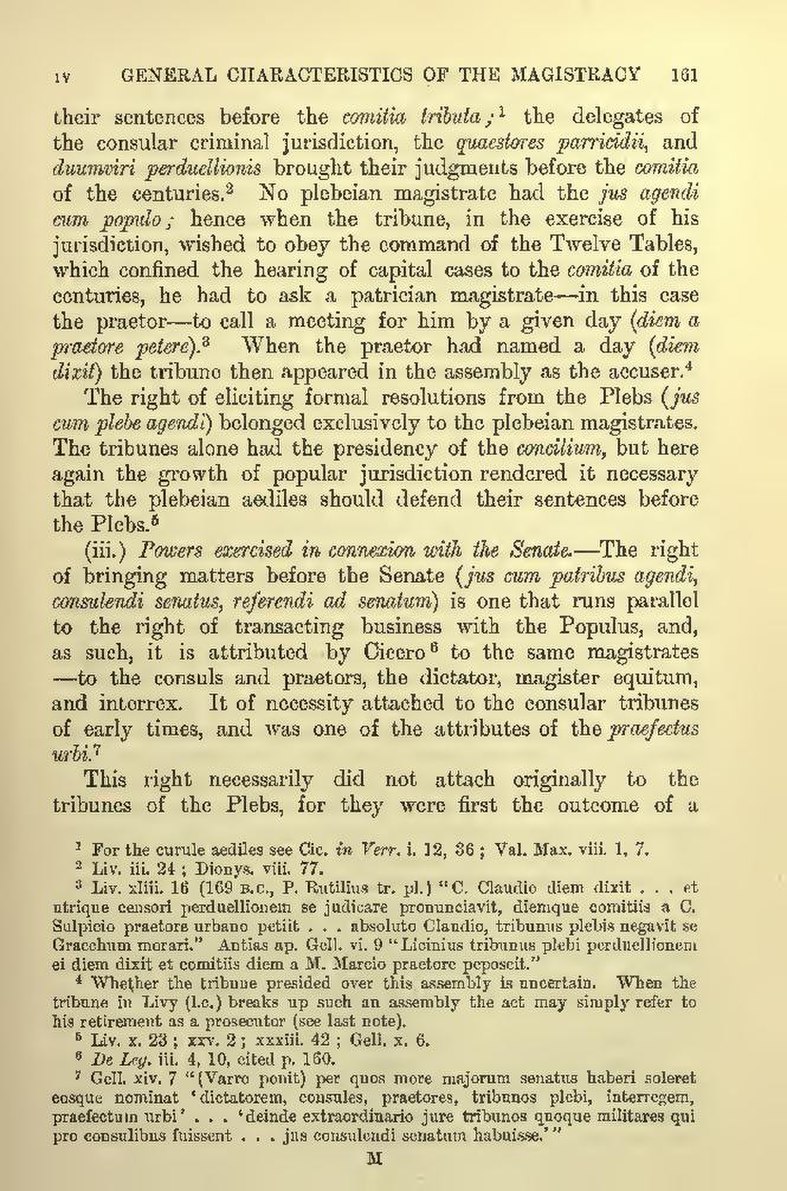their sentences before the comitia tributa;[1] the delegates of the consular criminal jurisdiction, the quaestores parricidii, and duumviri perduellionis brought their judgments before the comitia of the centuries.[2] No plebeian magistrate had the jus agendi cum populo; hence when the tribune, in the exercise of his jurisdiction, wished to obey the command of the Twelve Tables, which confined the hearing of capital cases to the comitia of the centuries, he had to ask a patrician magistrate—in this case the praetor—to call a meeting for him by a given day (diem a praetore petere).[3] When the praetor had named a day (diem dixit) the tribune then appeared in the assembly as the accuser.[4]
The right of eliciting formal resolutions from the Plebs (jus cum plebe agendi) belonged exclusively to the plebeian magistrates. The tribunes alone had the presidency of the concilium, but here again the growth of popular jurisdiction rendered it necessary that the plebeian aediles should defend their sentences before the Plebs.[5]
(iii.) Powers exercised in connexion with the Senate.—The right of bringing matters before the Senate (jus cum patribus agendi, consulendi senatus, referendi ad senatum) is one that runs parallel to the right of transacting business with the Populus, and, as such, it is attributed by Cicero[6] to the same magistrates—to the consuls and praetors, the dictator, magister equitum, and interrex. It of necessity attached to the consular tribunes of early times, and was one of the attributes of the praefectus urbi.[7]
This right necessarily did not attach originally to the tribunes of the Plebs, for they were first the outcome of a
- ↑ For the curule aediles see Cic. in Verr. i. 12, 36; Val. Max. viii. 1, 7.
- ↑ Liv. iii. 24; Dionys. viii. 77.
- ↑ Liv. xliii. 16 (169 B.C., P. Rutilius tr. pl.) "C. Claudio diem dixit . . . et utrique censori perduellionem se judicare pronunciavit, diemque comitiis a C. Sulpicio praetore urbano petiit . . . absoluto Claudio, tribunus plebis negavit se Gracchum morari." Antias ap. Gell. vi. 9 "Licinius tribunus plebi perduellionem ei diem dixit et comitiis diem a M. Marcio praetore peposcit."
- ↑ Whether the tribune presided over this assembly is uncertain. When the tribune in Livy (l.c.) breaks up such an assembly the act may simply refer to his retirement as a prosecutor (see last note).
- ↑ Liv. x. 23; xxv. 2; xxxiii. 42; Gell. x. 6.
- ↑ De Leg. iii. 4, 10, cited p. 160.
- ↑ Gell. xiv. 7 "(Varro ponit) per quos more majorum senatus haberi soleret eosque nominat 'dictatorem, consules, praetores, tribunos plebi, interregem, praefectum urbi' . . . 'deinde extraordinario jure tribunos quoque militares qui pro consulibus fuissent . . . jus consulendi senatum habuisse.'"
